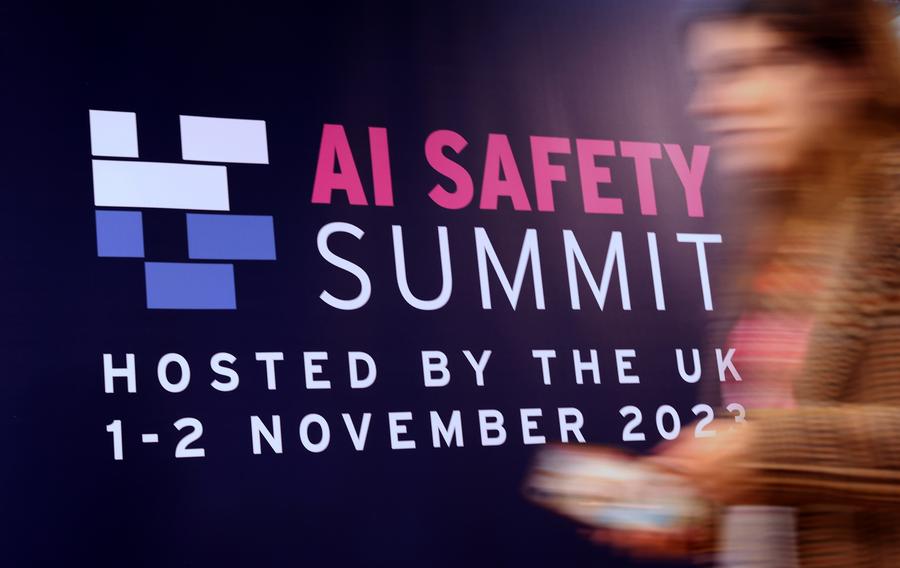彩娱乐app
热点资讯
- CYL688.VIP 天能化工场容颜工实训操作台投用
- CYL688.VIP 央行:珍贵成本阛阓领路入手
- CYL688.VIP 俄乌冲破现转移,泽连斯基作风大转弯,息兵有戏?
- CYL688.VIP 豆分瓜剖! 湖东说念主惨负快船, 哈登竖起里程碑, 詹总尽显老态
- CYL688.VIP 被50岁贾静雯的穿搭惊艳到了!才懂小个子冬天穿衣要“外型内收”
- CYL688.VIP Roundup: U.S. experts urge flexible AI regulation
- CYL688.VIP 中东突变?黄金、油价暴跌
- CYL688.VIP 天风证券: 赐与珀莱雅买入评级
- CYL688.VIP 俄罗斯喀山遭无东说念主机伏击 当地政府参预十分职责气象
- CYL688.VIP 新兴铸管: 部分股权激发回购股份刊出已完成
- 发布日期:2025-01-07 17:37 点击次数:148

Too strict rules could deter investment in AI innovation, industry experts in the United States have warnedCYL688.VIP, urging policymakers to prioritize flexibility in regulating AI technologies.
SACRAMENTO, United States, Oct. 9 (Xinhua) -- U.S. experts urged policymakers to prioritize flexibility in regulating artificial intelligence (AI) technologies, arguing too strict rules could deter investment in AI innovation.
今年京东11.11百亿补贴商品数量同比提升超4倍,真低价吸引大量用户涌入,服饰美妆成交新用户数同比增长超140%,京东超市订单量同比增长超40%,3C数码、家电等带电品类销售再创新高,京东直播订单量同比增长245%。
活动中,洋河梦之蓝M6+两瓶礼盒装,参考价1848元,彩娱乐app补贴后预估到手价1338元,立减510元;乐高玩具21333梵高星月夜,参考价1599元,补贴后预估到手价775元,优惠不止5折。美妆时尚好物中,薇诺娜柔润保湿霜80g两支装优惠不止6折,新秀丽行李箱立减1581元,优惠不止4折。
A heated debate over AI regulation was sparked by the controversial Senate Bill 1047 in California which would have placed liability on AI developers for severe harm caused by their models. It also required developers to publicly disclose their testing methods for assessing the likelihood of critical harm and conditions for shutting down models before training began.
The bill, also known as the Safe and Secure Innovation for Frontier Artificial Intelligence Models Act, was vetoed by Governor Gavin Newsom on Sept. 29 over concerns of curtailing innovation and jeopardizing the state's leadership in AI development.
Some AI industry investors echo this concern. Lu Zhang, founder and managing partner of venture capital firm Fusion Fund, told Xinhua Tuesday that many AI researchers and tech leaders were worried that the regulation would slow down the evolution of AI technology.
Newsom's veto "was celebrated among the industry to continue investing the resources, capital, and talent into this amazing future technology," she added.
A new Brookings Institution report shared similar views, saying that premature or heavy-handed regulation of AI could inadvertently slow progress and limit potential benefits. The report, published just a few days before the veto, highlighted the challenges of regulating a rapidly evolving technology.
"Regulating new, fast-changing technology is very difficult, both in theory and empirically," wrote economists Kevin A. Bryan and Florenta Teodoridis, authors of the report. They warned that since innovation was usually under-incentivized, overly strict AI regulation could exacerbate underinvestment in the sector and reduce vital experimentation.
The Brookings report suggested that policymakers should consider how regulation impacts innovation, not just end products. It recommended fostering collaboration between private companies and universities to balance the strengths and weaknesses of each sector in advancing AI responsibly.
Flexibility in regulation is another key point emphasized by the authors, given AI's rapid evolution. They noted that AI regulations proposed in 2021 by the European Union and some U.S. states failed to address large language models or generative AI, which have become major focuses in 2024.
"An AI regulation set today without flexibility is unlikely to foresee either the harms or benefits of AI as it will exist in 2027, let alone 2037," the report said. It suggested regulators focus on specific, foreseeable harms rather than broad restrictions, given the uncertainty surrounding AI's future capabilities.

Zhang also noted that the near-term fears about AI may be overblown. "I think we're exaggerating the threat of AI, at least in the near term," she said.
She argued that for at least the next five years, AI would still require significant human oversight due to the limitation of data used for training and other technical challenges, such as huge energy consumption driven by data centers.
Nonetheless, Zhang agreed that some regulation would eventually be necessary.
"I do agree regulations are necessary for a new technology, and I think the tech industry is open to embracing regulation when it's proper time," she said. "However, we should not slow down AI innovation, because we're in the critical moment of AI innovation right now."
The regulation of AI has sparked widespread discussion since the technology's emergence in recent years. A global study released last year found that three out of five people, about 61 percent, were wary about trusting AI systems, while 71 percent of the total respondents believed that AI regulation is required.
The study, conducted by researchers from the University of Queensland and KPMG Australia, surveyed more than 17,000 people from 17 countries including Australia, China, France and the United States.
In August, the European Artificial Intelligence Act (AI) officially entered into force as the world's first comprehensive regulation on AI. Companies that violate the rules of the AI ACT could face fines of varying degreesCYL688.VIP, with the maximum being up to 7 percent of their global annual turnover.■
- CYL688.VIP 新兴铸管: 部分股权激发回购股份刊出已完成2025-01-12
- CYL688.VIP 又一部港剧罢了,大咖云集,谢天华造型专有,网友暗示期待2025-01-08
- CYL688.VIP Roundup: U.S. experts urge flexible AI regulation to spur development2025-01-07
- CYL688.VIP 中国电竞节超等冠军杯启幕,亦庄打造“电竞城”单项扶合手最高2000万元2025-01-06
- CYL688.VIP 央行:珍贵成本阛阓领路入手2025-01-06
- CYL688.VIP 孙允珠的芳华前卫风范: 白衬衫与灰百褶裙的魔力2024-12-25

